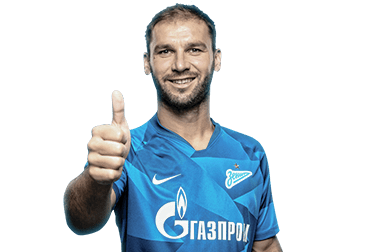On the footballing life ...
It's an intense life. It's very difficult to find what happens in football in any other sphere of activity. Every three days you create a different persona. A coach is only as good as his latest result. If you get a positive result, you're the greatest in the world; if the result isn't good, you're the least popular person in the world, especially with the fans.
It's a very difficult profession. But I've loved football since I was a boy. I didn't have too many options – I was one of many brothers and we were extremely poor, this was right after the war. So the only thing I could play was football. Everything I've achieved has been through football, and I'm extremely grateful to this game.
On what has kept him going ...
I started coaching at 28, so it has been 43 years now. My passion for football has enabled me to maintain my enthusiasm. I've always had very young players, whether it was with Corvinul Hunedoara, the Romanian national team, Dinamo Bucuresti or in Italy at Brescia, where a 16-year-old Andrea Pirlo played for me. I accumulated so much experience as a player and as captain of Romania, that I knew I should pass it on to the next generation.
On his travels abroad ...
As soon as it was possible, in 1990 after the fall of communism, I left Romania. I came from a communist country where there were very strict rules, so when I first stepped into the democratic world there was a lot of responsibility. The Italian league was quite difficult, but I got used to it and then it got easier.
I returned to Romania for 18 months and then left again, but from a different position and with more knowledge and self-confidence. That's how I ended up at Galatasaray and Besiktas, where I won championships. Then after a long period of exploration, about three years, I decided to move to Donetsk.
On his 12 years at Shakhtar ...
It was an extraordinary period, with some great performances, with a stadium that was always full.
We were very careful about the team's development – the fact I had almost five different teams during the period means a lot. When I decided, with the president, to base the team's style on the talent of Brazilian players, especially midfielders and forwards, we also factored in that while they'd come at 18 or 19, they would be wanting to leave when they were 24 or 25. So we always had a contingency to replace the players in the team. That's why Shakhtar never had problems caused by valuable players leaving.
On his new job at Zenit ...
My philosophy has always been to develop a certain type of player; my philosophy has always been to play attacking football. I was a forward.
We've tried to change the style a bit, especially because both Hulk and Ezequiel Garay very much wanted to leave. We had to change approach and make it a more collective effort, based on very good organisation and especially on the involvement of all players in the attacking phase. It's still early days in that respect.
However, things are going very well, because Shakhtar continue to win, using exactly the same players, and Zenit are trying to stay at a performance level that the people around us appreciate.
";s:4:"TYPE";s:4:"HTML";}